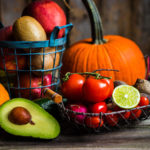How to Properly Store your Summer Fruits and Vegetable

Fruits and vegetables on wooden background
Although everyone longs for such a time that they have a bountiful pick up from the store that will save them the hustle of making endless trips to the store, it can be a daunting task when you finally have all those fruits and vegetable and can’t figure out how best to store them to prevent them from going stale especially during summer. In this article, we are going to explore some simple tact’s that you can adopt to properly store your summer fruits and vegetables.
In a cool and dry place
One of the best places to store fruits and vegetables is in a cool and dry place that has plenty of ventilation. This is a viable tact especially when it comes to produce such as bananas, tomatoes, potatoes, lemons, limes, mushrooms and eggplants.
In the refrigerator
Produce such as carrots, asparagus, grapes, berries, cherries, strawberries, lettuce, and rhubarb should be stored in the refrigerator since they tend to soften 10 times faster at room temperature.
In the freezer
Freezing fruits and vegetables is one of the fastest and most convenient ways for you to preserve produce at their peak mellowness and nutritional value. Nevertheless, there is produce that does not augur well with freezing such as the artichokes, Belgian endive, eggplant, lettuce greens, potatoes, radishes, sprouts and sweet potatoes.
At room temperature
Produce such as garlic, onions, tomatoes, cantaloupe and pineapples can be stored at room temperature as long as there is ample ventilation.
Other guidelines for storage include:
- Avoid the temptation to store fruits and vegetables together at all costs. This is because fruits give off elevated levels of ethylene that can cause untimely ripening and spoil surrounding vegetables.
- Before you store vegetables, remove any ties and rubber bands and trim the leafy ends then pack them freely in the refrigerator. Moreover, you can also choose to soak the vegetables in a sink full of water to ensure cleanliness except for soft herbs and mushrooms.
- Since non-cherry stone fruits, avocados, tomatoes, mangoes, melons, apples, and pears will continue to ripen if you leave them on the kitchen counter top or on top of the cutting board, you should consider keeping them in a refrigerator to preserve them.
Your summer will be a little less daunting once you have identified where to store certain fruits and vegetables. Don’t forget to prep all your fruits and vegetables on a beautiful engraved wooden cutting board.
 June 5, 2017
June 5, 2017 